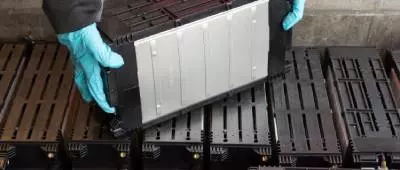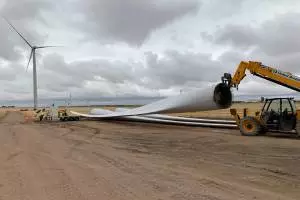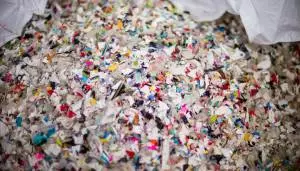Global Recycling Day (March 18) gives Veolia, Groupe Renault and Solvay the opportunity to announce their partnership: they are combining their expertise to recycle the metals in electric vehicle batteries in a closed loop. The stakes are high. By 2030, the number of electric vehicles on the road worldwide is expected to rise to 100 million, as against 10 million today. And ensuring access to responsibly sourced raw materials is a strategic challenge for Europe. The consortium illustrates a new type of collaboration in the electric battery value chain. The goal is to preserve resources, reduce carbon emissions and create value.
Groupe Renault is contributing its expertise in electric vehicle battery life cycle management, Solvay its expertise in the chemical extraction of battery metals, and Veolia its 10 years of experience in dismantling and recycling lithium-ion batteries via a hydrometallurgical process. The consortium created in September 2020 between Veolia and Solvay is thus strengthened by the automotive manufacturer's expertise.

The three partners aim to create a secure and sustainable source of supply for cobalt, nickel and lithium. They are leveraging their respective expertise at each step of the value chain - from collection of end-of-life batteries to dismantling, metal extraction and purification – and by enhancing existing hydrometallurgical recycling processes. With Solvay and Veolia's technologies, strategic materials will be extracted and purified into high-purity material ready to be reused in new batteries, thereby reducing their environmental footprint through this closed loop. Groupe Renault, Veolia and Solvay are committed to setting up a pre-industrial demo plant in France.
Luca de Meo, CEO of Renault, declared: Groupe Renault has a holistic approach to the battery life cycle: repairing first-life batteries to extend their automotive lifespan, developing second-life applications for energy storage and setting up a system for collecting and recycling batteries. Today, we are proud to reinforce our commitment to battery recycling by joining forces with Veolia and Solvay. We aim at implementing innovative and low-carbon battery recycling solutions to pave the way to sustainable sourcing for strategic battery materials as electric mobility is growing. Together, we will leverage our strong presence on the entire EV value chain in Europe to take a competitive position in the battery materials market and generate value beyond our core business.
Antoine Frérot CEO of Veolia, commented, Given the magnitude of the environmental issues the world is facing, ecological transformation is an urgent need. With Groupe Renault joining Veolia and Solvay, we are collectively taking a step further towards closed-loop solutions to preserve natural resources. This shows how companies working together can think up and implement new solutions that both better our environment and renew our economies.
Ilham Kadri, CEO of Solvay Group, added, This consortium is a great example of partnership in the value chain that makes circular economy come true for battery metals. We are thrilled to have Groupe Renault join the consortium and view them as a strategic partner in closing the loop of circularity, bringing input material for recycling and re-injecting purified metals into the battery cycle. This project exemplifies how we walk the talk with our Solvay One Planet sustainability road map as we aim to more than double revenues generated in a circular economy by 2030.
To illustrate the Global Recycling Day theme of "Recycling Heroes", Veolia is also presenting two recent innovations:
Second life for wind turbine blades, a first in the US

GE Renewable Energy has signed an agreement with Veolia to recycle its wind turbine blades to give them a second life in cement manufacturing - a first in the country's wind industry. The fiberglass blades are shredded at a Veolia plant in Missouri and processed with a solution that has already been proved in Europe. 90% of the blades are reused: 65% as raw material and 28% as energy. This results in a 27% reduction in CO2 emissions. Recycling one blade avoids the consumption of 5 t of coal, 2.7 t of silica, 1.9 t of limestone and 1 t of mineral materials. GE Renewable Energy is thus reducing its environmental impact by targeting carbon neutrality.
New PET recycling plant in Japan

Mitsui Corporation (MBK) has signed a joint venture agreement with Veolia and Seven & i, Japan's number one retailer with 20,000 convenience stores, to build a 25,000 t/year food-grade rPET recycled plastic production plant in 2022. Thanks to this project, Mitsui will be able to contribute to the circular plastics economy through its global network. Veolia already operates 10 PET recycling plants worldwide.
More:
> Recycling electric car batteries, an ecological issue
> The auto industry opts for a greener future
> Plastic recycling, a source of jobs in Europe
> Waste management
> Global Recycling Day 2021
> Press release, March 18, 2021 : Groupe renault, veolia & solvay join forces to recycle end-of-life ev battery metals in a closed loop


